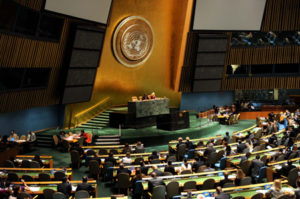The Bush administration boycotted the United Nations Human Rights Council since its creation three years ago, criticizing the Council for ignoring abuses in a number of states in favor of increasing the attention paid to Israel’s treatment of Palestinians (an issue that merits attention, but not instead of paying mind to other states’ egregious offenses).

The Obama administration took a different tack and submitted candidacy for a seat on the 47-member Council this year, hoping to improve and reform the institution from within. And today the United States, Cuba, Saudi Arabia and China—countries that have all faced criticism for their own human rights records—were elected by the UN General Assembly to the Human Rights Council. Freedom House, a U.S. pro-democracy group, called these latter three countries entirely unqualified to judge and promote human rights.
Will the participation of the United States improve the Council’s record? At this point, the Council has for the most part refrained from comment on human rights violations in Congo, Cuba and Sudan (Darfur). The United States has a chance to bring visibility to problems in these countries through its membership on the Council, but in the end, its vote is equal to that of Cuba, a country that has no interest in denouncing its own friends (e.g. China) and still claims its own human rights record is spotless.
Indeed, the EU and Cuba met Monday to discuss a number of issues of mutual concern, and the EU said it made no headway in urging Cuba to improve its human rights record. Cuban Foreign Minister Bruno Rodríguez gave the usual line that comes from the administration: Cuba does not hold a single political prisoner. Each prisoner underwent due legal process and the ultimate decision was legal, not political.
As we’ve noted before, the issue with this is one of semantics, not facts. Cuba is known to hold a number of prisoners that much of the international community considers unlawfully jailed dissidents, whereas Havana technically assigns them the name “foreign mercenaries” and claims that they are individuals that were paid by foreign governments (usually the United States) to try to overthrow the Cuban regime. With this fundamental distinction between the way Cuba presents the issue and the way other countries see it, it is hard to imagine discussions of these prisoners ever going past the current back-and-forth (“yes they are political prisoners”—“no they are not“). Such exchanges may begin to take place within the Human Rights Council, as well, if the United States dares engage directly on the topic.
Still, UN Watch director Hillel Neuer presents a worst-case scenario for the U.S. role on the Council that looks rather promising: “Nothing will stop America every day, every week, every month from introducing resolutions on Zimbabwe, on Cuba, on China. They will not be adopted—they will fail—but they will put a spotlight on the abusers.” Unfortunately, a spotlight alone will probably not be incentive for change soon.